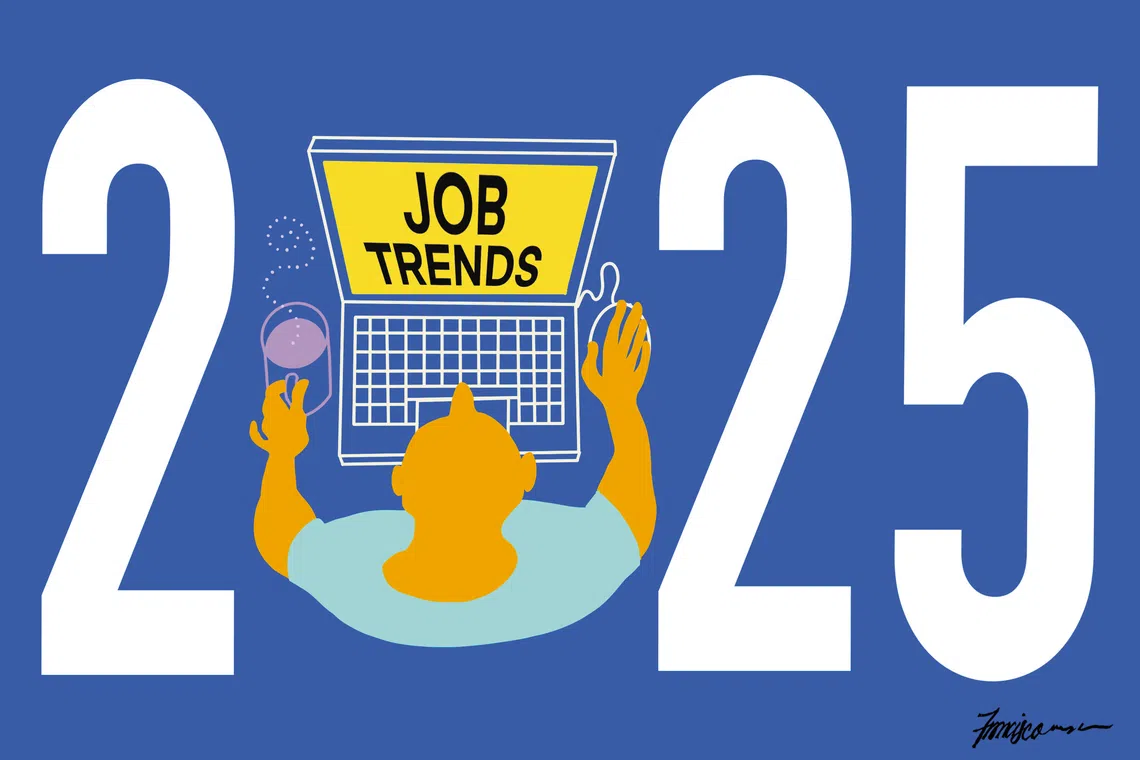askST Jobs: What trends will shake up workplaces in 2025?
Sign up now: Get tips on how to grow your career and money

Emerging areas such as sustainability and artificial intelligence are rapidly reshaping job scopes.
ST ILLUSTRATION: MANNY FRANCISCO
In this series, manpower reporter Tay Hong Yi offers practical answers to candid questions on navigating workplace challenges and getting ahead in your career. Get more tips by signing up to The Straits Times’ Headstart newsletter.
Q: What key work trends will 2025 bring and how can I make the most of them?
A: There are several job trends that are impacting the way talent is being upskilled, as well as the way organisations hire and relook job roles, said Ms Nicki Doble, principal adviser for corporate transformation at professional services firm KPMG here.
Emerging areas such as sustainability and artificial intelligence (AI) are rapidly reshaping job scopes, she noted.
“These areas, which were once considered niche, are now being seen as core competencies that employees will need to possess.
“In the next few years, baseline competency in these areas will become minimally expected of employees and impact even workers who are not part of related industries,” said Ms Doble.
Ms Iris Lew, senior engagement manager at strategic human resources consultancy DecodeHR, said: “Roles that are repetitive or routine in nature are at higher risk and will likely be displaced by AI eventually.”
These may include counter service staff, data entry assistants, telemarketers, assembly line workers, legal assistants, bookkeepers and junior programmers.
“If you are in a field facing possible changes, consider building new skills and exploring opportunities in expanding sectors, such as healthcare, technology and green energy, to stay competitive,” Ms Lew said.
While skill demands are evolving and deepening, workers can take comfort in the increasing traction for hiring based on demonstrable skills, rather than merely on paper credentials.
Ms Doble said: “This democratises job roles, enabling a greater pool of talent to be tapped.
“For employees, this shift underscores how transferable skills have become as important as core competencies when it comes to their perceived adaptability and the value they’re able to bring to their roles.”
Another trend is the rise of new working models, accelerated by the Covid-19 pandemic.
“Employers will need to cultivate an environment where teams can seamlessly collaborate and thrive, both in person and remotely,” Ms Doble said.
For workers to thrive as these trends take root, she suggests that they embrace lifelong learning with a focus on both technical and transferable skills, via SkillsFuture schemes, online courses and workshops.
Workers should also seek to gain multidisciplinary exposure across various functions in their organisation.
“By broadening knowledge and skill sets beyond core expertise, workers can better understand how different areas of the organisation intersect,” Ms Doble said.
This understanding could help workers better identify opportunities for innovation or solutions that directly address what employers need, especially in an increasingly interconnected work environment, she added.
The technology, healthcare and maritime sectors are poised for particularly significant transformation in the coming years, said Ms Doble.
“The technology sector will see increased demand for AI specialists focused on training, deployment of AI systems, and ethical considerations,” she added.
Healthcare, driven by the ageing population, will require more professionals in nursing, geriatric care and health technology integration.
“The maritime sector is also being reshaped by automation and digitalisation, demanding expertise in smart logistics and autonomous systems,” said Ms Doble.
Two other trends to watch out for are a boom in skilled trades and an increasingly multi-generational workforce.
On skilled trades, Ms Lew said: “Industries like manufacturing and construction need workers with specialised technical skills.
“Apprenticeships, technical certifications and vocational training can help workers gain hands-on experience and the qualifications needed for these roles.”
She added that “new-collar” jobs, which typically require a combination of technical skills without the need for a specialised degree, are also on the rise.
“Workers should look into gaining knowledge in areas such as cyber security, data analysis and robotics, as these fields are seeing rapid growth,” Ms Lew said.
She also advises workers to maintain mutual respect, open communication and a willingness to adapt to different working styles when interacting with colleagues across generations.
To thrive in 2025, one must do more than just shore up one’s technical skills.
“Soft skills such as communication, project management and critical thinking are also vital,” said Ms Lew.
“While automation may handle routine tasks, workers will still be needed for decision-making, troubleshooting and problem solving.”
They can put these soft skills into action through networking and career coaching sessions, which Ms Lew said would help workers build connections and learn how to transition into roles where existing skills are transferable.
Have a question? Send it to askst@sph.com.sg



